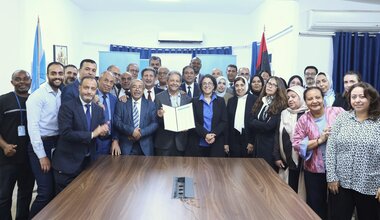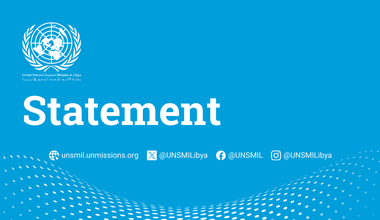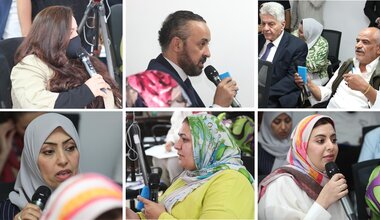The situation of migrants in transit through Libya en route to Europe - Breifing Note 08 May 2015
The tragic loss of hundreds of lives in the Mediterranean since-mid April highlights the critical importance and urgency of addressing the issue of migrants in transit through Libya en route to Europe, as unseaworthy boats carrying migrants, asylum-seekers and refugees continue to leave the Libyan coast. Despite the escalation of conflict in Libya, migration flows into the country continue amid widespread human rights abuses perpetrated by state and non-state actors against migrants, asylum-seekers and refugees in Libya in a climate of impunity. Those transiting through Libya include individuals seeking better economic opportunities as well as people fleeing conflict or persecution.
Against the backdrop of political crisis, armed hostilities, the absence of national asylum legislation and the breakdown of law and order, migrants, asylum-seekers and refugees in Libya are at risk of abuses including detention in horrific conditions; torture; abduction for ransom; exploitation; and killings. Smugglers and traffickers, who are thriving in the context of lawlessness, are responsible for many such abuses. Women migrants are especially vulnerable to sexual violence and sexual exploitation.
The deteriorating security situation, coupled with limited access to neighbouring countries by land, has compelled unprecedented numbers of migrants, asylum-seekers and refugees to undertake dangerous and frequently deadly journeys across the Mediterranean Sea in unseaworthy boats. At least 3,000 people lost their lives in 2014 in the Mediterranean, mostly after departing from Libyan shores. In 2015, up to 1,800 people are believed to have perished in the Mediterranean en route to Europe .
Perilous journeys
The scale of sea migration from Libya grew exponentially in the second half of 2014 and the trend continues into 2015. According to UNHCR and IOM, over 141,000 persons travelled from Libya to Italy in 2014. The estimated number of sea arrivals in Italy so far in 2015 stands at 60,000, most of whom departed from Libya. While the vast majority of these are adult males, there are also significant numbers of women and children, particularly unaccompanied minors.
Those transiting through Libya include nationals of Eritrea, Ethiopia, Gambia, Senegal, Sudan, Syria and other Sub-Saharan African countries. Members of well-established communities living permanently in Libya, such as Palestinians and Iraqis, are increasingly considering leaving the country given the dire security situation and ongoing abuses.
Many migrants, asylum-seekers and refugees become victims of brutal violence, coercion and abuse perpetrated by the smugglers along smuggling routes as well as in so-called "connection houses," where they await departure to Europe. Seeking to bypass official borders, many are kidnapped or coerced into dangerous journeys. Many report torture intended to extract more money from their families, in what appears to be a coordinated action from criminal gangs based in countries of origin as well as transit. In some cases, armed smugglers force them to board overcrowded boats and travel below deck in overheated engine rooms without water or ventilation.
According to IOM, last year, 4,868 lost their lives at sea or in remote deserts or mountains. This made 2014 the deadliest year on record, doubling the number of the previous year's deaths. The highest death toll was in the Mediterranean, where some 3,000 people drowned – most of them departing from Libyan shores. Up to 1,800 have lost their lives at sea since the beginning of 2015.
Abuses in detention
Following interception or rescue at sea, house raids or identity checks, thousands of migrants, asylum-seekers and refugees are arrested and detained in Libya for migration-related offences. UNSMIL is concerned that they faced torture and other ill-treatment upon arrest and in detention centres run by the Department of Combatting Irregular Migration (DCIM) and directly by armed groups. Many report beatings and whippings including with metal rods, cables and sticks; racial and other verbal insults; and suspension in contorted positions. In some centres, women are subjected to strip-searches, including intrusive cavity-searches, by male guards.
With the escalation of violence and shortage of resources in 2014, a number of the 20 detention centres as well as additional short-term holding facilities run by the DCIM have shut down. Some are now operational again including Abu Salim in Tripoli, al-Zawiya, Bourashada in Gheryan, Kararim in Misrata, Khoms, Sabrata and Surman in the west and four other centres in the east. A number of centres remain closed due to ongoing fighting including the Tweisha and Barak al-Shati. According to UNHCR and IOM, as of 4 May 2015, there were at least 3,245 migrants detained in western Libya, including 329 women and 34 children.
Foreign nationals are held in substandard detention conditions, in some cases amounting to cruel, inhuman and degrading treatment. Detainees are often crammed in overcrowded cells, without any or regular access to fresh air. Hygienic and sanitation conditions are deplorable, with detainees suffering from inadequate access to washing and sanitary facilities. In centres such as Kararim, detainees have no access to potable water. Shortages of food and other necessities, including those linked to personal hygiene, further exacerbate the situation of detainees. As a result of poor detention conditions, skin diseases have spread at an alarming rate. According to the International Medical Corps (IMC), which still visits detention centres in Libya, some 80% of the detainees suffer from skin diseases. There have also been reports of childbirths inside detention facilities, leading to post-natal complications as well as child deaths during birth or soon after. Detainees face inadequate or non-existent access to medical care, and the refusal of hospitals to admit patients from detention centres.
Abuses outside the context of detention for migration related offenses
Like other civilians in Libya, foreign nationals have been impacted by the ongoing conflicts. In recent months, foreign nationals have been killed including in the shelling of al-Zawiya in western Libya on 29 March and in terrorist bombings in al-Qubbah in eastern Libya on 20 February.
Egyptian Copts and other Christians have been abducted and unlawfully killed on account of their religion. The two videos of the killing of 21 and 30 foreign nationals circulated online on 20 February and 19 April , respectively, represent the most horrific, but not the only, incidents. Seven Egyptian Coptic migrant workers were abducted and shot dead in Benghazi, allegedly by Ansar al-Sharia, in February 2014. Another seven Egyptian migrant workers remain missing following their abductions in late 2014. They are believed to be held near Sirte by armed groups.
Foreign nationals have also been abducted by armed groups for ransom or on suspicion of engaging in armed hostilities particularly in the east of the country. In the latter case, they are not brought in front of judicial authorities to enable them to challenge the legality of their detention and are subjected to torture or other ill-treatment including in military and other makeshift detention centres.
Specific concerns facing refugees and asylum seekers
Libya has not ratified the 1951 Convention Relating to the Status of Refugees (Refugee Covention), but it is party to the 1969 OAU Convention Governing the Specific Aspects of Refugee Problems in Africa,, which in spirit incorporates the 1951 Refugee Convention and its 1967 Protocol. However, Libya's international obligations are yet to be implemented through national asylum legislation. Currently refugees and asylum-seekers are often considered illegal migrants. Persons living with HIV are particularly at risk of deportation. The protection and asylum space, already limited, has continued to shrink since the intensification of the conflicts in 2014.
Refugees in Libya do not have the right to work. They are afforded limited access to public education, health care and other social services, if they have valid documents. Access has traditionally been easier for groups such as Syrians, Iraqis, and Palestinians, than for sub-Saharan Africans; however, as a result of the escalation of the conflicts and competition for scarce resources, even these groups are reportedly being turned away from schools and hospitals as local authorities run out of funds to support social services. Meanwhile, livelihood opportunities are further diminishing as conflict and insecurity spreads into urban centers.
UN involvement
UNHCR and IOM continue to work closely with governments and other partners to address the mixed and complex migratory challenges and enable the development of protection-sensitive border management practices where feasible. UNHCR and IOM provide relief items and assistance to persons rescued at sea and in migration detention centres. The two UN entities are working with the Libyan Coast Guard, the DCIM and other partners to develop a stronger rescue at sea response, including through the development of protocols for information sharing, safe disembarkation and identification of persons in need of international protection. UNHCR is working with the DCIM to identify persons in need of international protection, and delivering medical assistance and relief items through its partner, IMC. UNHCR's current engagement with refugees in urban centers, primarily Tripoli and Benghazi, is focused on delivery of relief items and cash assistance through partners; border monitoring; and advocacy for alternatives to detention, particularly for individuals with specific needs. IOM continues to support the humanitarian evacuation of stranded migrants.
Recommendations
UNSMIL continues to appeal to all sides of the conflict to cease all armed hostilities and engage in an inclusive political dialogue, seeking to build a State based on democracy and respect for human rights and the rule of law. Pending a resolution of the current crisis, UNSMIL calls on the international community to:
- Effectively uphold the international obligation to save the lives of those seeking help at sea. European governments should dedicate naval and aerial resources for search and rescue operations on a scale commensurate with foreseeable expected departure trends.
- Increase the number of resettlement opportunities, humanitarian admissions and visas for people in need of international protection and ensure that refugees have effective access to asylum at land borders thereby reducing the number of those taking the sea crossing.
- Encourage countries en-route of these migratory flows to pass laws to crack down on the smugglers and to de-criminalize "irregular" migrants so that they can report smugglers to the police and contribute to efforts against trans-national organized crime.
- Provide sufficient resources and support to organizations working on improving the living and sanitary conditions of detention centres under the DCIM.
- Press Libyan authorities and those with effective control on the ground to refrain from torturing or otherwise ill-treating migrants, asylum-seekers and refugees and to find alternatives to detention, particularly for vulnerable groups and those in need of international protection.
 United Nations Peacekeeping
United Nations Peacekeeping UN
UN







